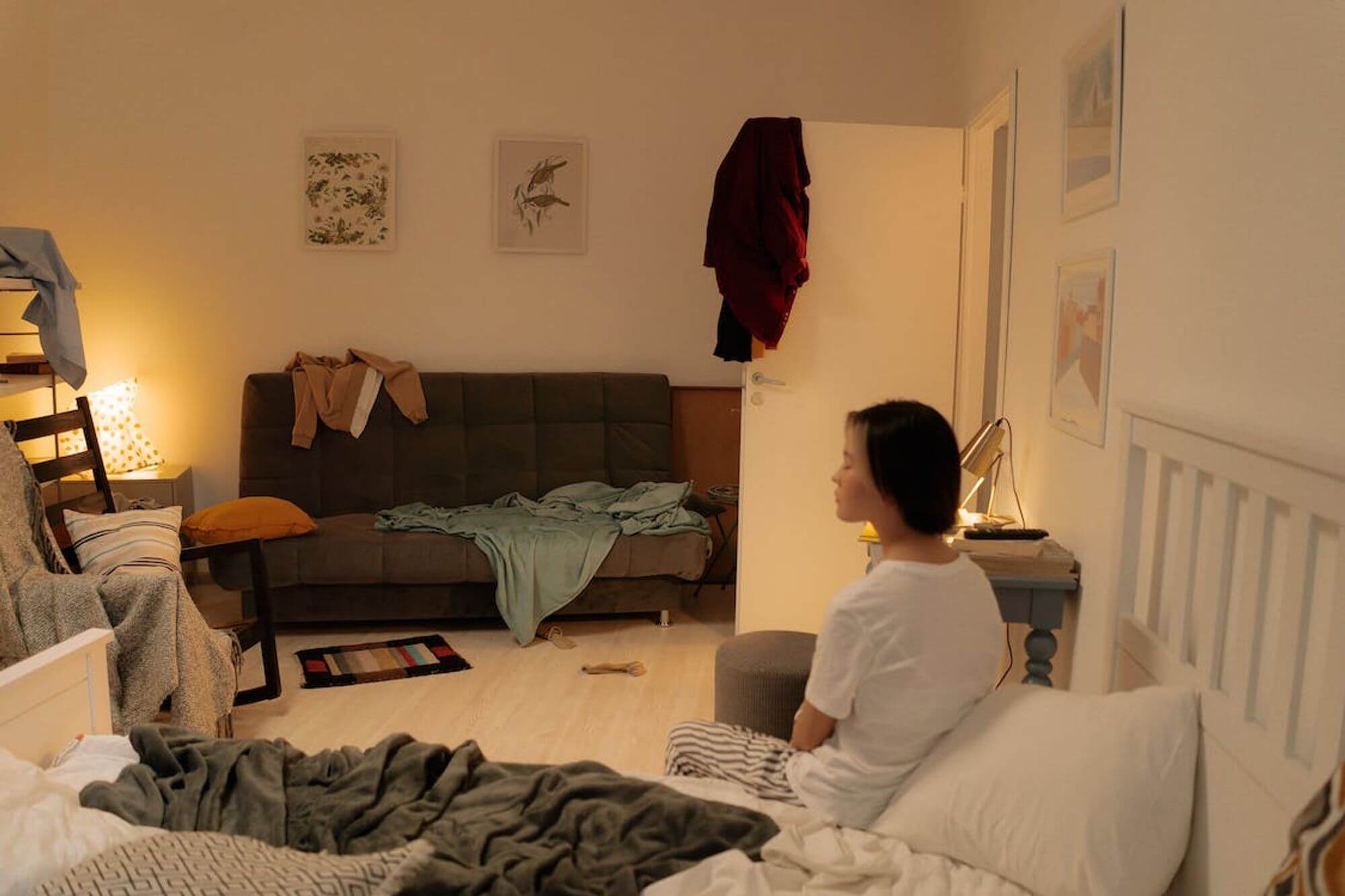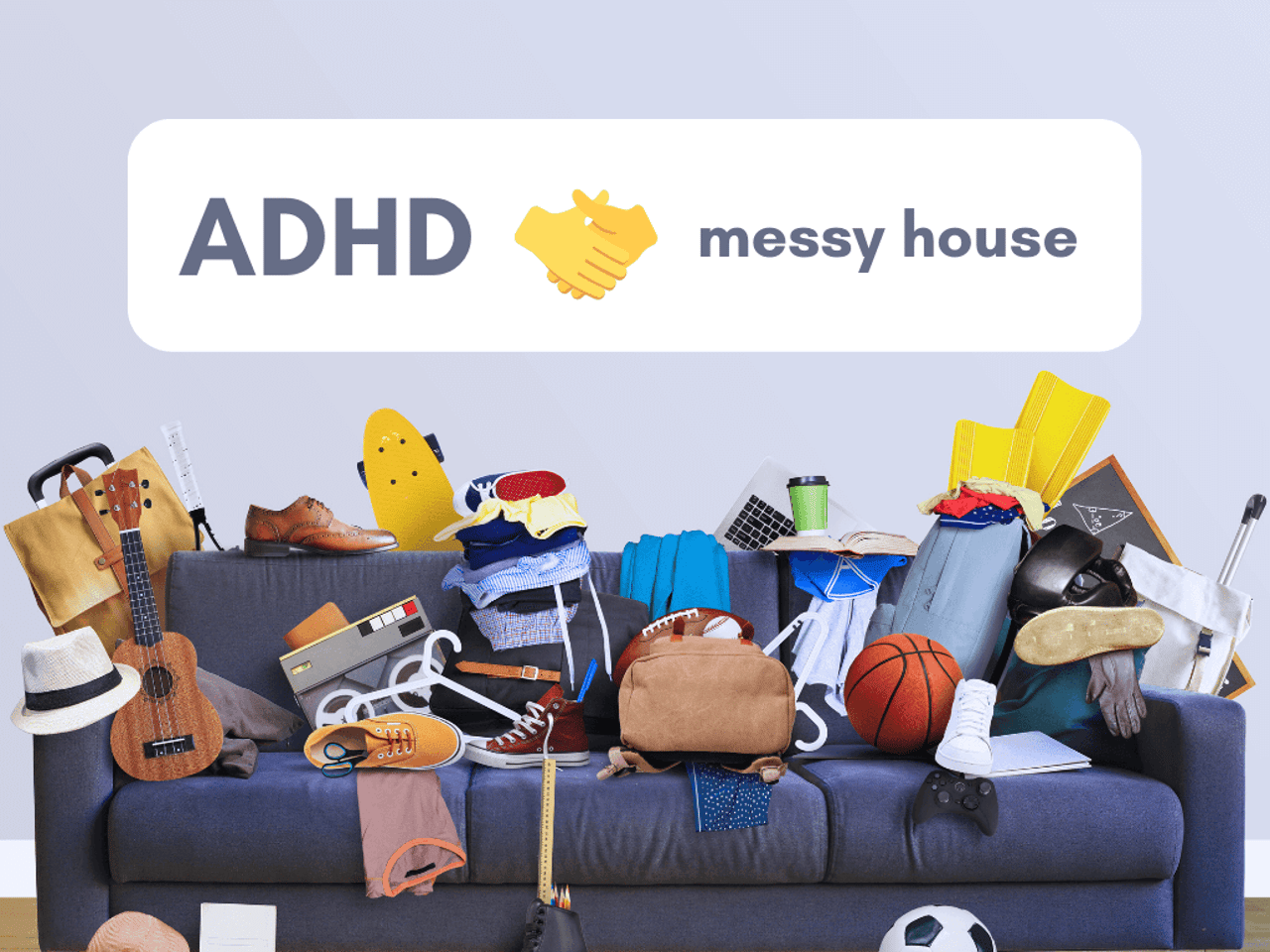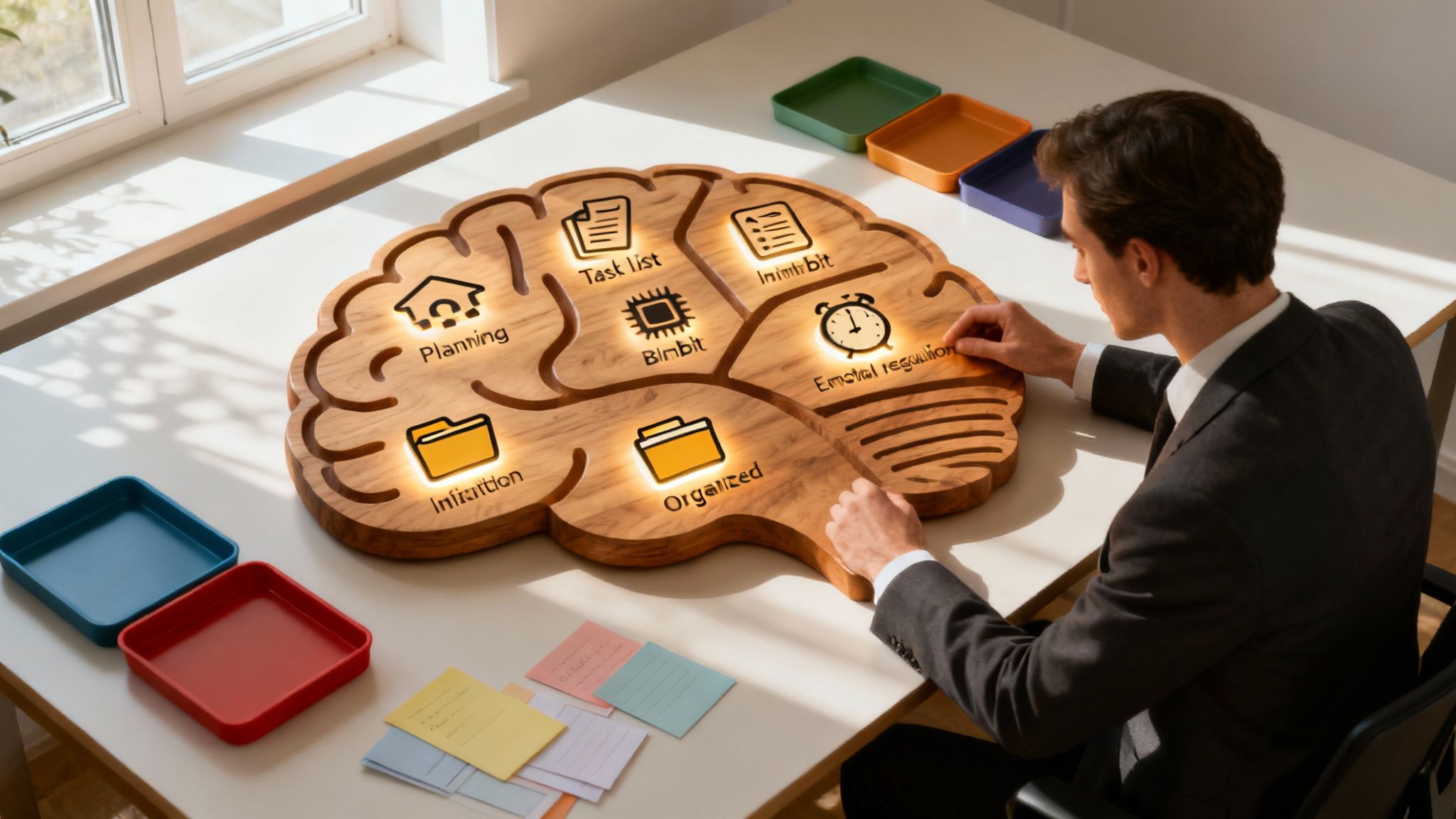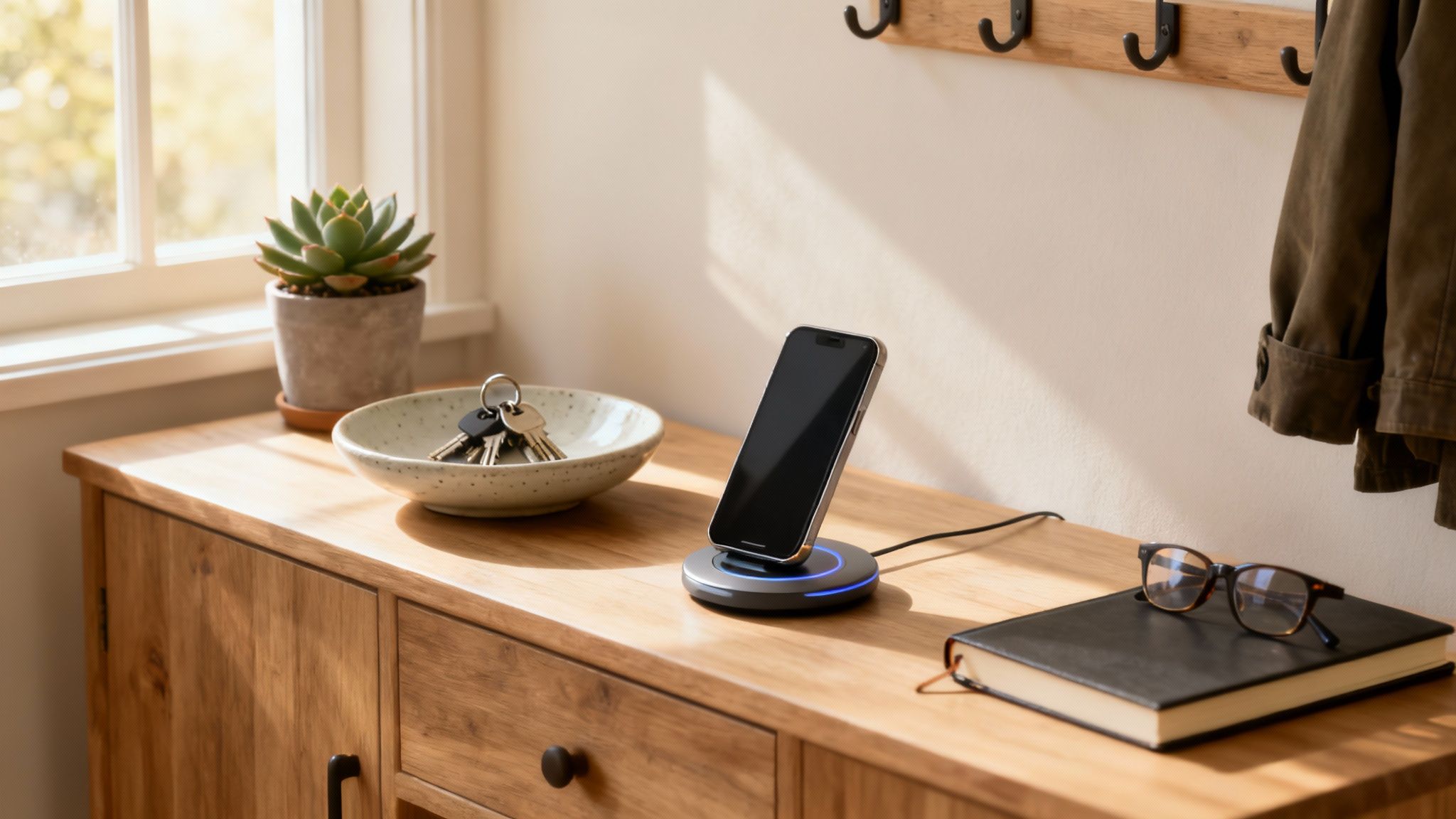If you walked into my house unannounced, you might immediately notice the random piles of stuff on my tables and the clothes kicked under my bed.
I want to say that I have a messy house because I have a child, but I'll be honest with you:
My living space has always been cluttered and disorganized.
Attention-deficit/hyperactivity disorder (ADHD) can make it seem impossible to keep a tidy house. As a result, ADHDers might have messy and unorganized homes and find that the usual tips and tricks don't work for them.
Fortunately, we understand the struggle, and we're here to share ADHD-friendly strategies you can use to manage clutter and keep your living space organized.
Too long; didn't read
- Mess and clutter are only harmful when it affects your quality of life, mental health, or functionality of your space.
- Traditional cleaning hacks and tips are often not as effective for ADHD brains due to the ADHD tax, among other reasons.
- ADHD-specific decluttering strategies should focus on increasing dopamine levels to help with self-motivation.
- The Inflow app contains more valuable information about ADHD and disorganization, as well as additional management hacks.
The definition of clutter
Psychologist Dr. Joseph Ferrari, known for his groundbreaking research on procrastination and clutter, has defined "clutter" as the following:
[Clutter is an] overabundance of possessions that collectively can create chaos and disorderly living spaces.
If you're looking around at a messy house while you read this and you're wondering if this definition applies to you, consider this:
Is the clutter preventing you from living your best life? If so, the mess may be contributing to dysfunction and chaos in your living space.
Cleaning to improve your mental health
One of the reasons I clean isn't because I'm finally prioritizing it; it's because my messy space makes me anxious. I have a hard time working in a room that isn't tidy, and I don't like making breakfast in a dirty kitchen. Especially if you've internalized any shame about the mess, try to think of it as self-care and choose an area to clean that will make the most difference to you.
Studies have even shown that clutter can negatively affect your mental health and quality of life.1
Examples of "bad clutter" that can interfere with your quality of life
- You can't use your kitchen sink because the dishes are overflowing.
- You missed the deadline for returning your child's permission slip because it got lost in a pile of mail and papers.
- Your closet is so cluttered that it's difficult to sort your clothes and find something to wear, frequently causing you to be late for events.
ADHD and clutter
The ADHD tax: clutter costs time and money
Dysfunction is one thing, but the mess becomes an even bigger problem when it costs money or wastes excessive amounts of time. For instance, if you're an ADHDer who has ever lost a bill or a gift card in a stack of mail or had groceries go bad because you can't see everything in your cluttered fridge, then you've paid the "ADHD tax."
So, while everyone experiences problems with clutter from time to time, ADHD can make it much more challenging to keep things clean and orderly.
ADHD and accumulating stuff
One of my favorite things about having ADHD is the tendency to get excited about so many things—hobbies, learning new things, books—but those things can start to pile up. And fast.
Before deciding to keep an item, ask yourself if you plan to use it anytime soon. If the answer is no, then maybe you should let it go. You can take your time deciding, but don't allow possessions from your past get in the way of creating a livable space.
For example - you know those "good" cardboard boxes you used for your move six years ago that you're still holding on to "just in case"?
You don't need them. I promise.

What's the link between ADHD and being unorganized?
ADHDers are often more prone to disorganization for several reasons.
Boredom intolerance
Individuals with ADHD typically need to be personally invested in something to feel motivated enough to do it. Because many ADHDers struggle with boredom intolerance, we often avoid tasks that don't interest or stimulate us enough, like cleaning and decluttering.
Co-occurring mental health conditions
People with ADHD are at a higher risk of developing comorbid conditions such as anxiety and depression, which make it even harder to initiate tasks related to housework.2
Sensory sensitivities
Additionally, sensory processing challenges are common in the ADHD population; since cleaning tasks can cause physical discomfort, decluttering can become associated with negative emotions, ultimately leading to avoidance.
How to declutter: 7 tips for ADHDers
Give these strategies a try to minimize your mess stress.

1. Create a sense of urgency by setting a timer.
Timers work because they create a sense of urgency by giving us an impending deadline. And a sense of urgency releases dopamine.
Choose a short time (like 10 minutes) and do as much cleaning as possible before the timer goes off.
2. Make two lists: a grocery list and a do-not-buy list.
If you're prone to impulse purchases, make a list and stick to it. If there are specific aisles you struggle with, such as office supplies or cosmetics, put them on a list of things to avoid.
You can also have your groceries delivered or schedule a pickup time to avoid temptation.
3. Put a trash can in every room.
Yes - Every. Single. Room!
If a trash can is in your sight, you'll be less likely to throw your trash elsewhere.
This idea can also be applied to laundry hampers and toy baskets.
4. Use a dynamic checklist.
One way to reduce the overwhelm that often comes with decluttering is to write it all down. It doesn't need to be fancy or detailed at first. It just needs to be on the list.
Once you've added everything you can think of, sort your decluttering tasks by room, task type, or priority.
🎉Bonus points if your checklist is digital and can be accessed across multiple devices or platforms.
5. Identify your doom piles. (And manage them.)
Doom piles refer to the haphazard stacking and ongoing accumulation of random items, leading to stress and uncertainty about what to do with them.
Identifying doom piles is easy—you probably actively avoid looking at them and feel overwhelmed at the thought of sorting through them.
Did you find them? Great!
Now, onto the hard part: managing them.
For example, here's what I did -
The only outlet strong enough to power my hair dryer is next to the front door. I used to depend on willpower to lug hair products to and from the bathroom every day. And then I realized I was only working against my ADHD brain.
Instead of getting angry with myself and feeling ashamed whenever I saw the pile I was trying to avoid, I managed the doom pile:
I bought a $12 basket with a lid to store my hair products, and now I have one less area to keep tidy.
6. Declutter often.
We hate to break it to you, but decluttering just once after reading this article isn't going to cut it. Instead, try scheduling twice-monthly decluttering sessions to start.
Take it slow, tackling a small chunk at a time.
7. It's okay to ask for help!
Don't be afraid to invite a friend over to help you clean, get your children or partner involved, or, if you have the resources, hire someone to help.
Finally, remember that your home doesn't reflect your character. Having a messy home isn't a personal failing, and it doesn't change your worth as a human being. In fact, it just means that you are human.
Learn and connect with people like you on an ADHD app.
Inflow is the leading ADHD management and education app for adults like you - people who just want to understand why they are the way that they are and learn ways to take back control.
In addition to an active ADHD community, Inflow has a library of mini-lessons to help you learn more about your brain, accompanied by practical, CBT-based strategies for managing ADHD challenges.
Try it out! Inflow's home organization module might be just what you're looking for!
-
Sources
1 Journal of Environmental Psychology | The dark side of home: Assessing possession ‘clutter’ on subjective well-being
2 BMC Psychiatry | Adult ADHD and comorbid disorders: clinical implications of a dimensional approach









